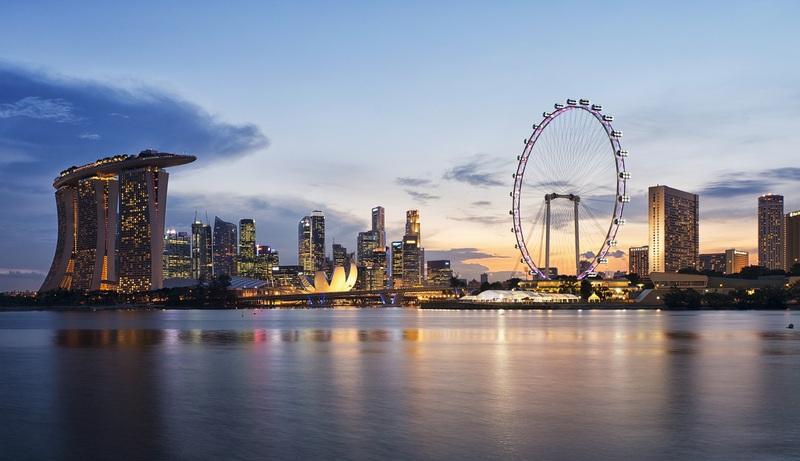This new way of life, where work is remotely done from home and retail activity has largely shifted online, may have at one point begged the question, "What now?" Aside from wondering when we'll be able to travel for leisure, we also want to know what the future holds for offices and office buildings now that COVID-19 has proven that working from home is a viable option. How will shopping malls and physical retail spaces change now that e-commerce has become the norm? This is where Lim and her team come in.
"I lead JLL's Asia Pacific Capital Markets Research team, where we track capital trends in the real estate landscape for Asia Pacific and provide agile, predictive, and actionable research and insights to investment managers, insurance, pension, and sovereign wealth funds," explains Lim. "I love this role as it involves figuring out how real estate, economics, and even politics could change over the next five to 10 years, which trends could prevail, and how we should best invest. The job utilizes my experience in urban planning, government policies, and equities research very well."
PROFILE
Of Place and Time
Photography by Chino Sardea, assisted by Mark Wee
Styling by CK Koo
Hair and makeup by Nikki Foo, Makeup using Shu Uemura and Hair using Redken
07 Oct 2020
In a time where everyone is going virtual, Regina Lim, Head of Capital Markets Research, APAC at JLL, makes a case for the physical.
"I was supposed to go on a walking trip in Japan this November," reveals Regina Lim while she was getting her hair and makeup done for this photo shoot. There was a slight tone of regret in her voice, which was understandable. Lim, the Head of Capital Markets Research, APAC, at Jones Lang LaSalle (JLL), like most of us, has been staying and working from home for the past few months.
 Regina wears shirt from Weekend by Max Mara, jeans from Brunello Cucinelli, heels by Jimmy Choo
Regina wears shirt from Weekend by Max Mara, jeans from Brunello Cucinelli, heels by Jimmy Choo
- THE GREAT SHAKE-UP
- THE FUTURE OF NORMAL
- DON'T SLEEP ON REAL ESTATE
The Great Shake-Up
According to Lim, COVID-19 started to become a real cause for concern when Wuhan initiated a lockdown just before Lunar New Year. "Knowing how important this time was for China, and how intelligent and far-sighted the Chinese government is, I knew it was no small matter and that we should brace ourselves for slower growth in China and Asia Pacific. Little did I expect the pandemic to affect the whole world."
Lim recalls, "As our clients and investors changed completely, our research priorities also had to pivot quickly. Investors had to focus on health and safety, tenant retention, and asset management. Therefore, we had to ask new questions, such as how this pandemic could be different from the last global disruption, what mitigating factors may help Asia Pacific weather this storm better than a decade ago, which sectors could hold up better, and how will investment strategies and capital deployment be changed."
Following major lockdowns in China and other parts of the world, including Singapore's own Circuit Breaker, JLL's property management services had to then act quickly to work with clients to ensure the health and safety of the users and customers of the facilities.
As a leader in real estate services, Lim reveals that JLL's corporate solutions teams had to work with commercial real estate leaders globally to assist their employees in working flexibly, negotiating with landlords on lease extensions or modifications, and assess how to reposition their real estate portfolios as we re-enter the workplace after lockdown.
She adds, "For capital markets, travel restrictions are impacting the investors’ ability to travel or conduct due diligence on assets. Furthermore, investors are challenged in pricing assets accurately given the economic uncertainty and big questions about the relevance, density, and frequency of usage of offices, retail malls, or hotels. This throws doubt on the income stream one could expect from these assets over the medium term."
(Related read: Where will you live and work in the future?)
- THE GREAT SHAKE-UP
- THE FUTURE OF NORMAL
- DON'T SLEEP ON REAL ESTATE
The Future of Normal
 Regina wears printed shirt and coat from Max & Co, jeans by Brunello Cucinelli, heels by Jimmy Choo
Regina wears printed shirt and coat from Max & Co, jeans by Brunello Cucinelli, heels by Jimmy Choo
You'd assume that working from home remotely would be enjoyable and seem like the work set-up we've all dreamt of. But according to Lim, JLL surveyed thousands of employees globally on the experience of working from home, and the consensus was that majority of working professionals surprisingly miss the office, proving that the concept of the office isn't entirely 'dead'. "They need the social interaction and collaboration for ideation and culture building, and a clear separation between their personal and professional lives," she shares.
Lim adds, "We also surveyed global corporates on how this disruption will change the way they use office spaces. Their response is that offices may need to be re-designed for wider spacing for health and safety and thus reduce seats for 100 staff to 82 from 91. To achieve this lower density, the majority of corporates intend to retain or expand their flexible working policies. This includes allowing employees to work some of the time from home, providing some co-working facilities for employees and potentially splitting teams into two office locations for business continuity."
As for the situation surrounding commercial retail spaces versus e-commerce, this is what Lim had to say: "We have actually been shopping online for a decade now. While this ongoing trend of online shopping accelerated somewhat during COVID-19, the disruption is less severe than expected. Globally, as lockdowns gradually ease and venues reopen, we witness a rebound in retail sales due to pent-up demand and high conversation rates in-store. Though this could be temporary. Where in place, social distancing measures will limit the recovery of some, including restaurants and leisure operators."
(Related read: Rachel is now live)
Lim urges retailers to look at this situation as a reset button, which presents an opportunity for them to become more resilient, create stores with unique offerings, and strengthen the omni-channel retail experience. "This will require a review of the wider supply chain and distribution networks, as well as the role of the physical store," she says. "For some retailers, this might result in an overall reduction of physical stores, while others might focus on opening smaller stores while implementing click-and-collect and other fulfillment services across their portfolios. Retailer business models and use of physical space are also evolving, supported by an increased focus on technology in order to provide a more convenient and efficient shopping process."



- THE GREAT SHAKE-UP
- THE FUTURE OF NORMAL
- DON'T SLEEP ON REAL ESTATE
Don't Sleep on Real Estate
Given the glimmer of hope, we can say that real estate still remains a viable investment product for current and future investors. "We expect Asia Pacific real estate to become even more relevant as an investment option in the coming decade due to macro trends," Lim says, optimistically.
"Interest rates are getting lower, driving more investors towards income-producing assets, such as real estate. Heightened volatility in the equity and bond markets also enhance real estate's attractiveness as a form of diversification given its relative stability. We also expect Asia Pacific's economies to continue to grow faster than other regions around the world due to demographics and faster adoption of technology. More wealth will be created and inherited and core real estate is likely to remain as a prudent store of value that can appreciate with the burgeoning of the region."
(Related read: The state of Asia Pacific's real estate)
With all this anticipated growth and promise, JLL also expects to evolve its services for its clients' needs in several ways. "First, to lead the way in real estate's digital age, we are investing in scalable proptech solutions that transform and improve how real estate is managed, analyzed, and transacted. Where available, we are harnessing data, artificial intelligence, and IoT tools to make buildings, spaces, and cities smarter and more user-friendly. Secondly, real estate accounts for nearly 40% of total carbon emissions. COVID-19 has helped many of us to realize that there is a strong and direct correlation between our environmental, social, and governance performance and the long-term health and success of our communities. JLL has proactively put into action a sustainability strategy to lead and reshape the real estate industry for a better world and to meet rising expectations of employees, investors, and communities."










 Back
Back